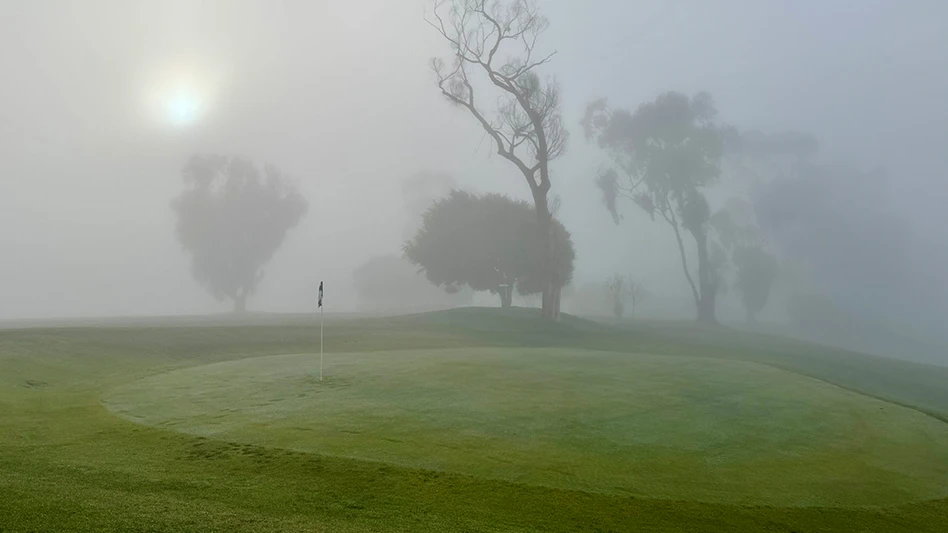 A generation ago, the only phone calls superintendents placed from a golf course were via a land line and probably to a distributor. While the Web forever altered how orders are now placed, the phone has arguably seen a greater revolution.
A generation ago, the only phone calls superintendents placed from a golf course were via a land line and probably to a distributor. While the Web forever altered how orders are now placed, the phone has arguably seen a greater revolution.
Rodney Crow, superintendent at Falconhead Golf Club in Austin, Texas, uses his iPhone for many different things, well beyond making calls.
"I have an app on the iPhone that allows me to log into my office computer and my irrigation computer to make changes, look up documents, etc.," he says. "I always like to be on the cutting edge of new things."
Crow, who has been in the golf course maintenance industry for 25 years – 16 as a superintendent – and at Falconhead since 2008, says there is less downtime in his day because of his iPhone.
"If I get a phone call from my boss asking about an invoice or a document, instead of driving all the way back to my office, I can look it up on the spot," he says. "This saves me countless hours of travel time."
 Rodney Crow, Falconhead Golf Club Rodney Crow, Falconhead Golf Club |
While Crow admits there are several apps pre-loaded on his phone that he'd just as soon delete, but can't, there are quite a few he uses regularly.
"On any given day, I use a translator app, a calendar/appointment reminder app, a unit conversion app (like gallons to ounces, etc), a turf management app and of course, e-mail," he says. "I use the translator and calendar very frequently."
Though there are many useful apps available, Crow has a few in mind he'd like to see offered.
"I would love to see an app that could help calculate calibrations on the fly," he says. "I'd love to be able to log into my pump station and look at all the pump numbers, gallons pumped since last reset, etc.
"I'd also like to see an app that would take a person through all the disease symptoms – a bit like a yes-or-no question tree where you answer questions until it pinpoints two or three possible diseases," he added. "Once it narrowed it down, it could then give you information on those two or three diseases so the superintendent could make a final decision as to which one he or she thinks it is."
According to Crow, it wouldn't take much to convince other superintendents that they should be using their phones for a great deal more than placing phone calls.
"I would show him or her how much more efficiently their time is being used when a smartphone is introduced into their day," he says. "Not having to constantly run back and forth to the office is a major time saver."
The iPhone isn't the only handy handheld device in Crow's arsenal. He also uses a Rainbird Freedom Radio, which allows his team to turn on any irrigation head on the golf course, regardless of their location.
"One of the advantages to handheld controls is the ability to multitask," he says. "For example, I can be on one golf hole doing a task while also running irrigation on other holes that are in eyesight. This gives me that ability to complete tasks quicker and more efficiently."
Dan Sorg has been a superintendent for four years, currently concluding his first year at Little Mountain Country Club in Concord, Ohio, and has been around handhelds for 15 years. At Little Mountain, he's using Motorola Radius P1225 handhelds with Site Pro Toro software that control each individual station on the course, along with program capabilities without having to touch a computer.
"The main reason I like handhelds, besides convenience, is the fact that I can control irrigation and physically observe the system for problems very easily," he says. "Making sure zones are running and heads are performing properly is very important for the overall health of the turf.
"I would recommend them to anyone," he adds. "They are easy to use and convenient for a superintendent dealing with a large irrigation system."
Sorg says he will be upgrading from Site Pro to the newest version within in a year due to federal guidelines with airwave frequencies.
 Bruce Burger, The Quarry Golf Club Bruce Burger, The Quarry Golf Club |
Bruce Burger, CGCS, has been at The Quarry Golf Club in San Antonio, Texas since it was built in 1983. Though he's never had a handheld irrigation controller, he knows the value.
"As a daily fee golf course, we do about 10,000 tournament rounds a year, in addition to just regular play," he says. "We only close on Christmas and Thanksgiving, so we have to water in fertilizer quickly and sometimes between groups. I've often seen a green open with no players and wished I could just pop on the heads via radio, but I have to take the time to drive over to the controller and fire it up manually which, frankly, wastes time."
Though The Quarry may not utilize the latest and greatest in hand held technology, the course isn't operating in the Dark Ages. Burger and his staff take advantage of the Telvent weather service, an online subscription service based out of Omaha, Neb.
According to Burger, the company used to broadcast satellite feeds to each subscriber, but has moved online to meet today's needs. It's basically a new version of the old data transmission network system, he adds.
"The great thing about it is you select your site, as in The Quarry Golf Club, then it is pinpointed and all the forecasts revolve around that site," Burger says. "It gives you 10- and 30-mile warning rings around your site and will predict, down to the minute, when rain is going to occur.
"It gives lightning strikes and the distance from the site down to tenths of a mile," he continues. "It's very accurate and gives you an 'all clear' message when lightning is out of range. The good thing is that the messages come directly to my smartphone, as well, so I can see what's happening at all times. The weather graphics are really good and so is the long-range weather information."
Burger says the Telvent weather service has saved The Quarry quite a bit of money by being able to accurately forecast when rain is going to stop so they are able to get the tournaments in and not lose revenue. At the same time, he is able to schedule his crew efficiently around the rain and knows when to send them back out safely.
Like Burger, Crow takes advantage of software on a day-to-day basis, beyond the popular Microsoft Excel, Word and Outlook titles.
"I use quite a few programs," he says. "I use an AutoCAD program to update or print out my irrigation maps. Our irrigation computer uses the Rainbird Nimbus central control system, and to log into my computers, I use a program called 'Logmein.'"
His company also uses GoToMeeting.com to conduct meetings without having to travel, which Crow calls "a huge time and money saver."
While handheld controls may not be for everyone – like superintendents who prefer to manually do the task to make sure it is done correctly – and computers become limited when connection to the Internet is lost or the occasional crash or virus pops up, there is no debate that today's superintendents have a wealth of high-tech options at their fingertips and many use all they can to their full advantage.
"The use of technology has not only made my day more productive, but has also allowed me to stay better organized," Crow says. "It has given me the ability to keep up to date on the latest trends, data and research. But most importantly, it has allowed me the ability to double-check systems that normally would increase the stress in my day, specifically my irrigation system during this record-setting drought we've had in Texas."
And he's not alone at Falconhead Golf Club.
"In addition to all [I do], my equipment manager uses a computer program called 'ManagerPlus,' which gives us the ability to schedule equipment service, track all parts inventory and costs, track all equipment repairs and their related costs and generate reports and documentation of every service or repair performed," Crow says.
In an industry where success and failure often hinge on the most minute detail, productivity and results are often enhanced by the availability of modern technology.
Rob Thomas is a Cleveland-based freelance writer and frequent GCI contributor.

Explore the January 2012 Issue
Check out more from this issue and find your next story to read.
Latest from Golf Course Industry
- Beyond the Page 65: New faces on the back page
- From the publisher’s pen: New? No way!
- Indiana course upgrades range with synthetic ‘bunkers’
- Monterey Peninsula CC Shore Course renovation almost finished
- KemperSports and Touchstone Golf announce partnership
- PBI-Gordon Company hires marketing manager Jared Hoyle
- Mountain Sky Guest Ranch announces bunker enhancement project
- GCSAA names Joshua Tapp director of environmental programs





